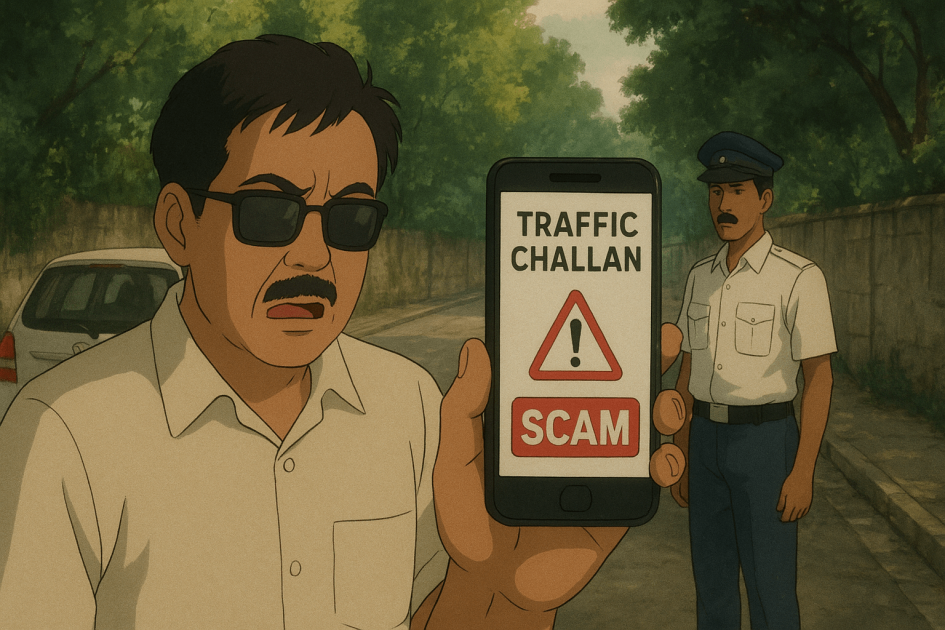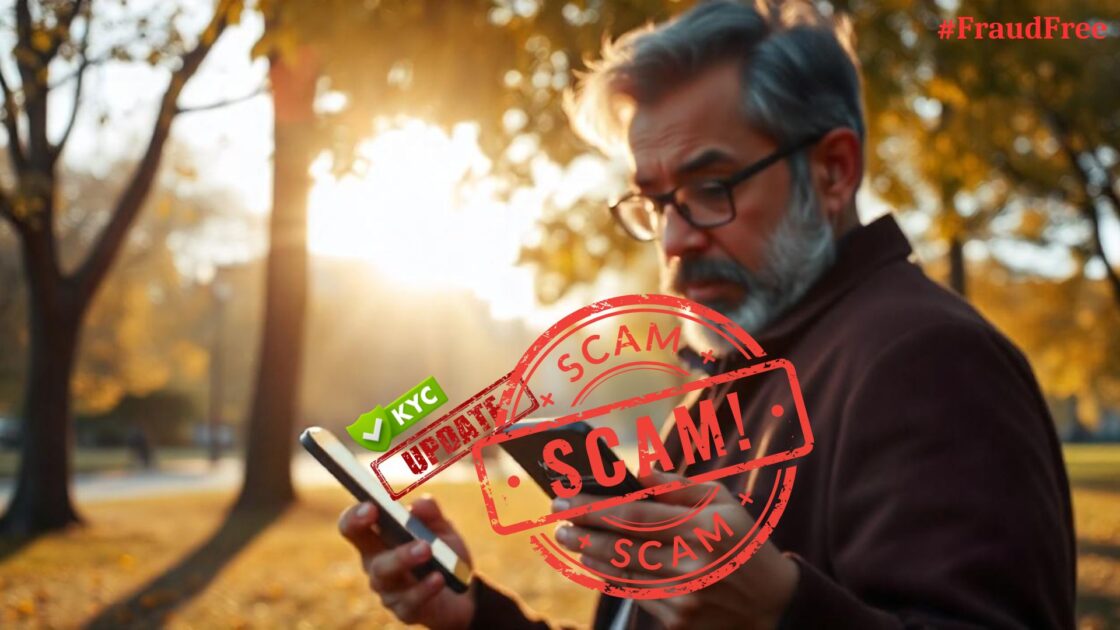The Traffic Challan APK scam is one of the fastest-growing cyber frauds, exploiting people’s fear of fines and law enforcement.
Thinking about how it works?
Well, it targets people by creating fear and urgency.
Imagine receiving a WhatsApp message late at night saying: “E-Challan issued for your vehicle KA-01-XX-1234. Download eChallan.apk to view and pay immediately.”
Scared and thinking it’s an official message from the traffic police, you download the APK. Within hours, you notice UPI notifications, unauthorized transactions, or even loans taken in your name.
Unfortunately, this is the reality for many Indians today.
What is the Traffic Challan APK Scam?
If you are still confident and wondering, ‘can scammer hack my phone?’, then don’t skip reading this.
Traffic Challan APK scam runs on the same model where scammers use phishing and malware tricks targeting Android users. Scammers send messages claiming that a traffic fine has been issued for your vehicle. The message includes a link or an APK (Android app file) to “view or pay the e-challan.”
Here’s the catch: the APK is malicious software. It’s not an official app from the traffic police or RTO. Once installed, it can:
- Steal your banking credentials and UPI PINs
- Read your SMS messages and OTPs
- Take unauthorized payments or loans in your name
- Access personal data like contacts, photos, and documents
Important: Official e-challan portals, such as mParivahan or your state RTO website, never send APKs via WhatsApp or SMS.
Modus Operandi of Traffic Challan APK Scam
- The Bait
Scammers send a message with your vehicle number or a fake deadline, creating urgency. Example: “Pay within 24 hours to avoid arrest.” - Malicious APK or Link
The message contains an APK file, often named like “RTO e-Challan” or “Traffic Fine Viewer.” Clicking the link or installing the APK is the crucial mistake. - Installing and Granting Permissions
The APK requests dangerous permissions: SMS, Contacts, Device Admin, and Accessibility access. These permissions allow the app to control your phone, read messages, and even perform transactions without your knowledge. - The Malware at Work
Once installed, the app can:- Intercept OTPs to approve UPI or bank transactions
- Display fake overlay screens on banking apps to capture login credentials
- Take loans or wallet payments in your name
- Collect personal data for future identity theft
- Monetization by Scammers
Attackers steal money directly through unauthorized transactions, take microloans, or sell stolen data. Victims often realize the loss only after receiving bank alerts or loan notices.
How to Identify a Traffic Challan Scam
Knowing the warning signs can save you from major losses:
- Unknown sender: A mobile number or WhatsApp account claiming to be “Traffic Police” without proper credentials.
- Suspicious message content: Urgent deadlines, threatening language, and your vehicle number included.
- APK file or fake link: Any message asking to download .apk files is a red flag.
- Permissions: If an app asks for Accessibility, Device Admin, or SMS access, it’s likely malicious.
- Check official portals: Verify challans only via mParivahan.gov.in or your state RTO.
Rule of thumb: If it’s sent via WhatsApp, SMS, or Telegram, it’s probably a scam.
Real Cases of Traffic Challan APK Scams
These scams are not just rumors—they have caused real financial losses:
- Lucknow: A woman lost ₹12.21 lakh after installing a fake e-challan APK.
- Ahmedabad: ₹11.75 lakh stolen when a victim downloaded “RTO e-Challan 500” app.
- Pune: Two individuals lost ₹32 lakh combined through similar fraudulent apps.
- Bengaluru: A 57-year-old man lost over ₹5 lakh after clicking a fake APK link.
- Hyderabad: ₹1.72 lakh lost via a deceptive mobile app posing as the official transport app.
These cases show how scammers exploit fear, urgency, and trust in official-looking apps.
How to Report Online Scammer?
If you or someone you know encounters such a scam, reporting is crucial:
- File a complaint in Cyber Crime
- Visit cyber crime portal.
- Select “Complaint Registration then Fraud/Scams. To register, then click on Other Fraud”
- Upload screenshots, sender number, APK file name, and any transaction details
- Submit and note your complaint ID
- Lodge an FIR in Local Police
- Bring screenshots, sender number, APK (if safe), and bank transaction proof
- Request an FIR for cyber fraud
- Report to Banks / UPI Apps
- Call customer care immediately
- Block accounts or cards
- Request reversal/chargeback for unauthorized transactions
Need Help?
Register with us and we will check all details of the message and the sender and help you to register a complaint online on the respective platform.
How to Protect Yourself from Traffic Challan Scam?
Follow these steps to stay safe:
- Never install APKs from messages or unknown websites
- Only use the Google Play Store for apps
- Avoid granting Accessibility or Device Admin permissions to unknown apps
- Verify e-challans on official portals only
- Enable Google Play Protect and keep Android updated
- Be cautious of urgent or threatening messages
Pro tip: Always pause and verify before clicking. Scammers rely on panic and urgency.
Conclusion
The Traffic Challan APK scam is a reminder that cybercriminals exploit fear to steal money and personal information.
Official traffic departments never send APK files via WhatsApp or SMS, and the only safe way to check or pay challans is through official RTO or mParivahan portals.
If you receive a suspicious message: don’t click, don’t install, and report immediately. Awareness and caution are your best protection.







